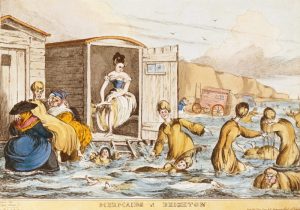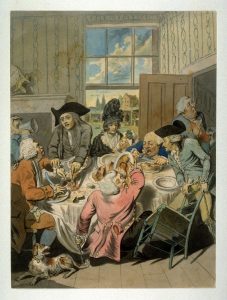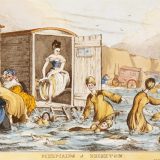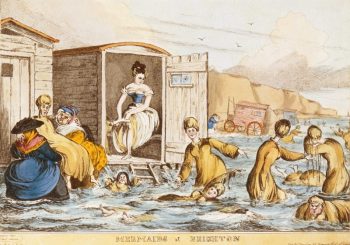The Expedition of Humphry Clinker – Tobias Smollett – 1771
Posted by Steven on 3/9/2012, 9:29:04
I am about a third of the way through this novel and enjoying it. Has anyone else started it?
Earlier this year I read two of Smollet’s earlier novels, The Adventures of Roderick Random and The Adventures of Peregrine Pickle. They are both picaresque novels and more similar to each other than to Humphry Clinker, though all of his works seem to have common themes that reflect Smollett’s interesting and varied career. In addition to his literary career as playwright, poet, novelist, historian and editor, he was also a naval surgeon serving in the West Indies and in later life traveled extensively in Europe. Roderick Random is his most autobiographical work, depicting the hardships of life aboard an English man o’war.
~
Posted by Steven on 3/9/2012, 11:58:05, in reply to “The Expedition of Humphry Clinker”
I just discovered this page about Humphry Clinker that focuses on the travelers’ visit to London. Unfortunately the map images are too small to read all the legends.
http://drc.usask.ca/projects/eng803/heather/smollett/humphryclinker.html
~
Posted by Sterling on 3/9/2012, 17:16:48, in reply to “The Expedition of Humphry Clinker”
I’m also about a third of the way through Humphry Clinker and enjoying it.
I read Roderick Random many years ago. John Barth wrote the introduction, which I thought appropriate since his The Sot-Weed Factor is the best 18th-century novel pastiche I’ve ever read. Anyway, Barth said (I’m quoting from memory), “The great thing about a Smollett novel is that one quick reading does it.”
~
Posted by Sterling on 14/9/2012, 13:37:47, in reply to “Re: The Expedition of Humphry Clinker”
I’ve finished. Very enjoyable novel. Some scenes, such as Bramble being dragged naked from the water by his ear or the doctor at Bath’s lengthy and detailed celebration of…um…human waste, are truly memorable.
~
Posted by Steven on 16/9/2012, 9:39:03, in reply to “Re: The Expedition of Humphry Clinker”
: I’ve finished. Very enjoyable novel. Some scenes, such
: as Bramble being dragged naked from the water by his
: ear or the doctor at Bath’s lengthy and detailed
: celebration of…um…human waste, are truly
: memorable.
There are quite a few references and puns about bare buttocks as well. Of course Humphry Clinker himself is introduced into the novel with an exposed rear end. Winifred later writes of her visit to London: “And I have seen the Park, and the paleass of Saint Gimses, and the king’s and the queen’s magisterial pursing, and the sweet young princes, and the hillyfents, and pye bald ass, and all the rest of the royal family.” She later asserts she is not given to “tailbaring.”
Of course one thing I have to remind myself of sometimes is that in 18th and 19th century English usage the word “naked” often means only insufficiently dressed. Smollett will say of a lady that she was “completely naked… dressed only in her shift” (which probably covered her chin to toe). I’ve read three of his novels this year and in each of them there is a fire alarm that causes people to rush thus “naked” out into public view. So I don’t imagine Matthew Bramble was any more “naked” than this at the beach.
~
Posted by Sterling on 16/9/2012, 10:49:40, in reply to “Re: The Expedition of Humphry Clinker”
: Of course one thing I have to remind myself of
: sometimes is that in 18th and 19th century English
: usage the word “naked” often means only
: insufficiently dressed. Smollett will say of a lady
: that she was “completely naked… dressed only in
: her shift” (which probably covered her chin to
: toe). I’ve read three of his novels this year and in
: each of them there is a fire alarm that causes people
: to rush thus “naked” out into public view.
: So I don’t imagine Matthew Bramble was any more
: “naked” than this at the beach.
Perhaps not, but it’s funnier to me to think that Squire Bramble was naked as a jaybird. I realize that the Wikipedia is not always reliable. However, it has this to say in the entry on the history of the swimsuit:
“In the United Kingdom until the mid-19th century there was no law against nude swimming, with each town being free to make its own laws.
In rivers, lakes, streams and the sea men swam in the nude, where the practice was common. Those who didn’t swim in the nude, stripped to their underwear. The English practice of men swimming in the nude was banned in the United Kingdom in 1860. Drawers, or caleçons as they were called, came into use in the 1860s. Even then there were many who protested against them and wanted to remain in the nude.”
Clothing was required at Bath, but perhaps not in Scarborough.
Women, according to this article, bathed with some kind of clothing after 1670. Apparently female nude bathing was the norm before.
Anyway, Smollett is, in my opinion, pretty darn funny. Both Fielding and Sterne are very funny as well. All three of them enjoy humor so risqué that our Victorian ancestors must have been horrified. Smollett is cruder and more scatological than Fielding and Sterne, but, based on the two novels I have now read, his work deserves to be considered in their company.

~
Posted by Sterling on 16/9/2012, 11:07:17, in reply to “Re: The Expedition of Humphry Clinker”
SPOILER*******SPOILER*******SPOILER*******SPOILER
I was puzzled for a good deal of the novel as to why it was named after Humphry Clinker, who does not even appear until a quarter of the way through the book and who appears to be a decidedly secondary character.
One might think that this would alert me that something extraordinary was to happen with regard to Clinker, but I assumed it was just a dry joke of Smollett’s. It is also of interest that all Smollett’s other novels are called “Adventures,” rather than “Expeditions.” Certainly, it is Clinker who undergoes the greatest transformation in status over the course of the novel. He is also arguably the most surprising character, appearing as a bare-behinded pauper, a farrier or blacksmith, a Methodist preacher, an accused highwayman, and so on.
~
Posted by Steven on 16/9/2012, 11:39:43, in reply to “Re: The Expedition of Humphry Clinker”
: I was puzzled for a good deal of the novel as to why
: it was named after Humphry Clinker, who does not even
: appear until a quarter of the way through the book and
: who appears to be a decidedly secondary character.
My theory is that the title reflects the fact that Humphry becomes the focus and moral center of the journey for everyone, and if they were to think back on it what they would each remark on was that it was the journey in which they found their long lost son/nephew/cousin and, in Winifred’s case, husband.
Smollett may also have wanted to avoid singling out one of the five letter-writers as being more significant or accurate in his/her point of view than the others.
: It is also of interest that all
: Smollett’s other novels are called
: “Adventures,” rather than
: “Expeditions.”
They are very different types of novels, too. His “adventures” are picaresque novels, while the “expedition” is something totally different.
~
Posted by Steven on 16/9/2012, 11:32:17, in reply to “Re: The Expedition of Humphry Clinker”
That’s an interesting article on the swimsuit. It’s still a bit ambiguous about whether the nude swimming prior to the mid-19th century included nudity in the presence of the opposite sex. I’m inclined to believe it didn’t Of course we see works of art from many centuries depicting nude bathers, but that’s a bohemian perspective that doesn’t apply to ordinary people. I think the exposure of women’s breasts was treated much more casually in the 18th century than it is now because of breastfeeding, but I suspect total nudity, even in private, was pretty rare.
Of course I was raised in a church that strictly prohibited “mixed bathing,” by which they meant people of different genders swimming in the same body of water at the same time even with swimsuits. I’ve never been or seen anyone naked out of doors, so it may be just sour grapes on my part that I don’t believe Smollett’s characters had that freedom. 😀
~
Posted by guillermo maynez on 17/9/2012, 11:22:33, in reply to “Re: The Expedition of Humphry Clinker”
For all I’ve read, the XVIII century was a lot less prudish than the mid-to-late XIX. I also don´t believe people from both sexes bathed in the nude together, though.
On a more general note, I also enjoyed the book very much. It is a very likable journal, and it made me want to plan a trip following the footsteps of Bramble and Co. Of course, I’d find things MUCH changed in certain aspects, but the British tend to be very good at preserving what deserves to be preserved, so I’d still have the perspective of finding beautiful towns. 11 years ago, I travelled through some parts of Scotland, and fell in love with it: Edinburgh, Fort Williams, Loch Ness, Inverness, and some other towns. Now I need to go to Glasgow and Dumfries, as well as the rest of the places visited by the characters.
Matthew Bramble, for all his grumpiness, sounds like a man with whom a glass of wine and a conversation must have been most enjoyable, and J. Melford also a guy to meet. Lydia should be a nice, pretty girlfriend, and Mrs. Tabitha Bramble someone NOT to have around. Lismahago yes, for an acid discussion.
~
Posted by Steven on 17/9/2012, 19:00:56, in reply to “Re: The Expedition of Humphry Clinker”
: it made me
: want to plan a trip following the footsteps of Bramble
: and Co.
My wife and I have been wanting for two years to make a trip to England, which we’ve never done, and just today she was showing me a tour itinerary that follows Bramble’s route almost exactly. Unfortunately there’s no telling if and when we’ll be able to go. It will be next year at the earliest.
: Matthew Bramble, for all his grumpiness, sounds like a
: man with whom a glass of wine and a conversation must
: have been most enjoyable,
I think Jeri describes him perfectly somewhere as a misanthrope on the outside but a humanist on the inside. I think Matthew and I have a lot in common that way, as most people would describe me as grumpy as well.
Lydia wouldn’t be much to my taste as a girlfriend. She seems too helpless and fragile. Her friend Letty sounds much more likable. I thought she and Jeri were going to hook up, but it didn’t happen.
I have some passages marked to quote, but I’ll post them separately. My internet service has been going on and off for the last three days, so I don’t want to draft a long message and lose it.
~
Posted by Sterling on 18/9/2012, 21:43:02, in reply to “Re: The Expedition of Humphry Clinker”
: I think Jeri describes him perfectly somewhere as a
: misanthrope on the outside but a humanist on the
: inside. I think Matthew and I have a lot in common
: that way, as most people would describe me as grumpy
: as well.
I guess because of the nature of our acquaintance (only through postings on RL), I didn’t realize you are thought of as grumpy. The humanist is what comes through in your posts. :^)
: I thought she and Jeri were
: going to hook up, but it didn’t happen.
I did, too. I expected everybody to get married (except for Bramble). All three of the marriages were well prepared for throughout the course of the novel. I think Smollett teased us with Letty to see if we would bite at imagining he would “pull the rabbit our of the hat” and resort to such a contrived union. I feel like he plays little jokes on the reader (which both Fielding and Sterne do as well).
I enjoyed the epistolary format very much. The different voices are entertaining, and it is interesting to see the same event from different viewpoints. May be I’ll try Clarissa sometime after all.
~
Posted by guillermo maynez on 19/9/2012, 10:41:44, in reply to “Re: The Expedition of Humphry Clinker”
I guess I’ve posted before how I find XVIII century’s books much more in tune with XX century’s experiments than with XIX century’s realist novels. Authors such as Diderot (for example in “Jacques and his Master”), of course Sterne, not to mention de Sade, seem to anticipate many of the most extreme forms of literary experiments of the at once brilliant and gloomy XX Century. Smollett here is not that adventurous, but still he is less conventional than the masters of the XIX novel.
~
Posted by Steven on 20/9/2012, 13:55:31, in reply to “Re: The Expedition of Humphry Clinker”
: Smollett here is not that
: adventurous, but still he is less conventional than
: the masters of the XIX novel.
The two earlier novels by Smollett that I read were more conventional picaresque novels in form, but they were both a bit bawdier than Humphry Clinker–certainly nothing you would see from the pen of a Dickens, Eliot or Trollope. It’s not just a case of what goes on, but of the implied attitude towards it as well. Roderick Random jokes about leaving a servant girl pregnant, and Peregrine Pickle’s visits to prostitutes don’t raise any moral issues. In Roderick Random there is also a reference to homosexuality aboard naval vessels.
In Humphry Clinker I noted this passage: “The old gentleman [Matthew Bramble] told me last night, with great good-humour, that betwixt the age of twenty and forty, he had been obliged to provide for nine bastards, sworn to him by women whom he never saw.”
And there is this episode in Winifred’s continual battle with spelling: “…both our gentlemen have got a sad could by lying in damp shits at sir Tummas Ballfart’s.”
I wonder if the 19th century editions of these novels were bowdlerized.
~
Posted by Sterling on 21/9/2012, 21:38:17, in reply to “Re: The Expedition of Humphry Clinker”
: I guess I’ve posted before how I find XVIII century’s
: books much more in tune with XX century’s experiments
: than with XIX century’s realist novels. Authors such
: as Diderot (for example in “Jacques and his
: Master”), of course Sterne, not to mention de
: Sade, seem to anticipate many of the most extreme
: forms of literary experiments of the at once brilliant
: and gloomy XX Century. Smollett here is not that
: adventurous, but still he is less conventional than
: the masters of the XIX novel.
It is certainly true that the 18th century writers appear to more heavily influence the late 20th century post-modernists. I was dumbfounded when I first read Tristram Shandy. Sterne, Diderot, Fielding et al. were inventing the modern novel. They were making up the rules as they went along, which gave them incredible freedom. The 19th century novelists were working from inside a tradition. Their work is often wonderful, but rarely feels experimental.
Except for Herman Melville. After writing his early best-selling South Sea adventures, he wrote three of the most daring, knotty, gnarled, demanding novels of the century: Moby Dick, Pierre or the Ambiguities, and The Confidence-Man. Not only are these works of highly original formal construction (especially Moby Dick), they are novels of bizarre, Freudian depths. They are precursors of the modernist (as opposed to post-modernist) novel. They were all miserable failures in their day.
~
Posted by Steven on 22/9/2012, 7:30:22, in reply to “Re: The Expedition of Humphry Clinker”
One interesting aspect of Smollett’s novel–and another area in which it contrasts with 19th century fiction–is its treatment of religion.
The prevailing Anglican church gets scarcely any mention that I can recall. In the two earlier novels I read, the clergy were often satirized as cowardly and gluttonous supporters of the established order with all its injustices.
Humphry Clinker’s Methodism is, however, more ambiguously portrayed. Humphry himself is treated sympathetically, and both Matthew Bramble and his nephew praise him for his piety even though they are in no hurry to adopt his creed. And Humphrey, in the end, is the hero who brings everything to a happy conclusion for all. But through Tabitha and Winifred the author seems to ridicule Humphrey’s evangelism. For Tabitha it is another excuse to look down her nose at the rest of humanity, and with Winifred we have such wonderfully telling bloopers as “through the grease of God” and to “deify the devil and all his works.”
~
Posted by Guillermo Maynez on 22/9/2012, 9:44:56, in reply to “Re: The Expedition of Humphry Clinker”
I agree with Steven’s comments on the treatment of religion. My sense was that Smollett wasn’t much of a Church man, poking constant, if benevolent, fun at Humphrey’s Methodism and the ladies’ following him in opportunism (Tabitha) and blissful ignorance (Winifred).
Sterling: thanks for pointing out Melville. I haven’t read “Pierre or the Ambiguities” (in fact I don’t think I had ever heard about it), or “The Confidence Man”, but you bet I will do it soon. Now, I read “Moby Dick” a long time ago, but I’m sure it feels much more like a XVIII Century work than a XIX one. That’s one in my rereading list; I was mesmerized and fascinated by it the first time.
~
Posted by Steven on 23/9/2012, 11:11:10, in reply to “Re: The Expedition of Humphry Clinker”
One of my favorite passages from the novel was Matthew Bramble’s diatribe against the unsanitary practices in London for handling milk and other foods. The letter is the one dated June 8. I won’t quote all of it–you probably remember it anyway–but there is this passage in conclusion:
“Now, all these enormities might be remedied with a very little attention to the article of police, or civil regulation; but the wise patriots of London have taken it into their heads, that all regulation is inconsistent with liberty; and that every man ought to live in his own way, without restraint…”
I can’t help but think about today’s Libertarians and Tea Party when I read this. Perhaps if they read this letter they might be a little less avid about dismantling our government.
In any event, this and other such remarks by Bramble really demonstrate Smollett’s medical background and good common sense when it comes to public health.
~
Posted by Steven on 20/9/2012, 13:22:31, in reply to “Re: The Expedition of Humphry Clinker”
: I enjoyed the epistolary format very much. The
: different voices are entertaining, and it is
: interesting to see the same event from different
: viewpoints. May be I’ll try Clarissa sometime after
: all.
Yes, I think the epistolary novel with its multiple voices and often unreliable narrators has a definite affinity with today’s post-modern fiction (and this relates to Guillermo’s comment as well).
Just keep in mind that Clarissa is to Humphry Clinker as a supertanker is to a speedboat.
~
Posted by Joffre on 12/10/2014, 19:45:54
I read Humphry Clinker a couple months ago and found it dull as hell.
~
https://www.theguardian.com/books/booksblog/2013/aug/12/summer-voyages-humphry-clinker-tobias-smollett

You can find the full text here:
http://www.gasl.org/refbib/Smollett__Humphry_Clinker.pdf















